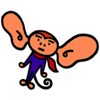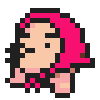Feelings of MOTHER 3 – April 18th, 2006
by: Echoes on 9/11/2021
To be honest, when I heard MOTHER 3 was resuming development, I wondered how on Earth you got the motivation to do it.
Itoi: Oh, that was three years ago now.
Yeah. Development on the original version of MOTHER 3 was abandoned. It was an unprecedented situation for such a flagship game. And when things finally started to cool down, you decided to start from scratch all over again.
Itoi: From an objective point of view, that’s true. Moreover, the Almost Daily Itoi News was off to a good start. I know it might sound strange to say this, but I feel my job flows a lot smoother when I’m not involved in games.
I think so too. Of course, as a fan I’m genuinely happy for you. But as someone who knows the behind the scenes circumstances and magnitude of the previous cancellation, I was really wondering how’d you do it all again. When I first joined Itoi’s office, development on the game just restarted. First of all, please tell us the story behind the redevelopment.
Itoi: It all started when I went to Kyoto one day. I was at Nintendo for some work, and was taking a taxi back to Kyoto afterwards. Shigeru Miyamoto and Satoru Iwata were riding with me as well, but then Miyamoto-san said, “Please make MOTHER 3 for the Game Boy Advance.”
He said, “Please make it!”, not “Would you like to make it?”
Itoi: So then I asked, “Is that even possible?” To be honest, I didn’t really understand at the time. But then I asked again, “Is it possible?”, and he thought it was. So now that I think back on it, it was a very honest conversation. I wasn’t thinking much about how hard it would be, or exactly what I should do. I hadn’t really thought much about the future. But, I thought it may be possible. So when I got out of the taxi, I realized that I was happy to talk about it again after all.
I understand.
Itoi: Of course, it wasn’t all just spur of the moment. I did a lot of preparation leading up to this. Before and after we announced the cancellation, I’d occasionally revisit the idea from time to time. Iwata-san, who was not quite president at the time, often discussed with me what the ideal circumstances might be. What kind of environment would it best require, and what company? If we were to do it, what would be our options? We’d been talking about it for a long time. But, it all started from that honest conversation in the taxi that day.
While I’m happy that it resumed development, was it scary to jump back into the fray that day?
Itoi: It was terrifying. One of the reasons was because the original MOTHER 3 was a so-called “blockbuster movie.” The specs of the game were lowered by making it for the Game Boy Advance. The movie-like direction I originally envisioned had to be taken back to the drawing board. I wasn’t sure I could do it. In other words, the previous MOTHER 3 was completely reliant on the specs of the system. So I thought to myself, “the wind blows, and the dust rises”...that’s what was on my mind at the time.
At the time the Nintendo 64 was released, I thought games would be enriched by such cinematic experiences. It was very beneficial for game creators like yourself, Itoi-san.
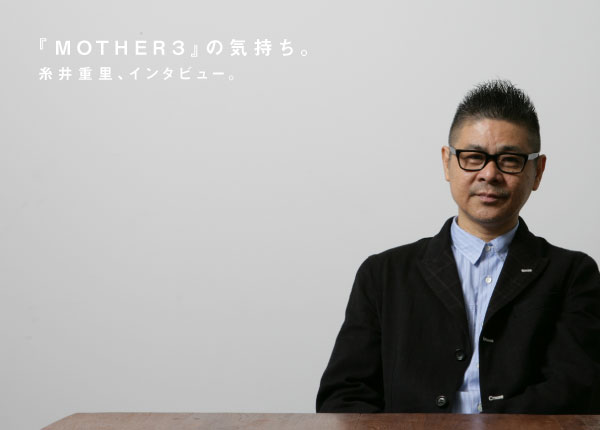
Itoi: Yeah. It was a nice change of pace having games become more and more cinematic, but at the same time I was envious. I thought, “if they can do it, so can I!” After all, I was influenced by visuals I never would’ve imagined beforehand. On the other hand, when I decided to make it for the Game Boy Advance, I knew I had to take more responsibility in supervising the project. I knew right away the weight of the game would be held on my shoulders. That was a little scary. But, you can say it doesn’t matter where the theater is as long as the movie script itself is good. But when it came to say, “let’s do it in a small theater” , I was a little wary.
I see.
Itoi: I already had a lot of fears and potential obstacles. But in the end, I went ahead with it anyway. So I thought to myself, “If I just take a month or so to myself, and concentrate on writing interesting dialogue and scenarios, I’m sure I can do it!” So that’s what I told myself, and I decided to do it.
Also, the reason I wanted to make MOTHER 3 again…this is actually a little difficult to put into words, but I feel “the game called MOTHER”’ has become a shared property for everyone, rather than existing solely inside of me.
You mean the MOTHER series as a whole.
Itoi: Yes. I know this may be complicated, but it’s a very important point I’d like to make. I don’t want fans to simply say, “MOTHER belongs to everyone.” I often hear fans say, “We raised it.” I don’t think that’s true myself. After all, the ‘band’ that made MOTHER 1 and 2 did their best. That’s what I think!
However…
Itoi: However…(laughs) it’s the same for Hobonichi. Or rather, it’s like that for MOTHER, but even more so with Hobonichi. It’s hard to say we made it with our own strength alone. In other words, since the advent of emails, we’ve been able to hear directly from people, words like “laughter, good, bad, crying” etc. That’s what we’re working with.
I understand.
Itoi: Especially when MOTHER 1+2 came out three years ago. Like somebody playing it with their son, or an actor I once met at a job that used to play the games all the time. I get emails like that which make me feel like crying. It was then I realized we weren’t alone in making this. I thought, “Wow, this is really heavy.” But, at the end of it all I feel a sense of happiness.
I’m glad.
Itoi: In the midst of all this, we had a roundtable discussion about the cancellation of MOTHER 3. At the time, I felt like I was…speaking from within a dream. In my own opinion, I felt as if I was selfish in making such a statement. But, I didn’t think I was completely done with the project.
Ah, I see.
Itoi: Because I still have memories of making MOTHER 3. No matter how many procedural aspects I settled upon back then, a voice kept saying to me, “You can’t make such a decision!” Even after, there was always a person somewhere who said to me, “I won’t let you forget about this!” (laughs)
Yeah (laughs).
Itoi: The fans have such an incredible voice. Even at the time it was decided the game would be canceled, we knew it would come back sooner or later. When MOTHER 1+2 was released, some fans felt angered while others were tearful. I don’t understand it, but I feel that’s a product of what the game called “MOTHER” created. Overall, there’s been so many cheerful consumers. So after it was announced we’d restart development, I told them to “please wait quietly.” And they really did. When the internet began to develop like this, before I knew it only negative opinions remained and simmered in one place. It felt like, “that positive, white light has all been shrouded by this cloudy grey, hasn’t it?”, and then suddenly even that grey zone disappeared. In such a situation, the feedback from customers themselves was immensely helpful. So…even though I may have my whole life ahead of me, I know the MOTHER series is something I’ll never forget. Yes, it’s only natural for someone like myself to have such deep feelings like that. I thought from now on I should devote my time to what Takaaki Yoshimoto calls “work from 25:00”, so I took the job. But, well, that’s a long story (laughs).
No, no (laughs)!
Itoi: So, I don’t want to simply just say thank you to everybody (laughs). Through all these experiences, it’s become such a long story.
Yeah.
Itoi: I’d like to add it feels like I myself am included in “everybody.”
After hearing your story, I thought one of the reasons you decided to restart development of MOTHER 3 was that Miyamoto-san and Iwata-san offered you such an opportunity. It was pretty big, wasn’t it?
Itoi: Yeah, it was big! It was great! Because they know what they are saying along with all the difficulties. You know, it doesn’t just start with, “you’ll make tons of money!” Of course, since it’s the two of them, business is something we always have in mind. That’s always a part of it.
That’s right.
Itoi: So, I don’t know…I know earlier I said I didn’t want to simply say “thank you” to all of you. Just like how I don’t want to simply say, “the world doesn’t run on money alone!”
Yeah (laughs).
Itoi: Something mundane like, “I love money.” Sure, I would love to say it 500 times over first. Eventually, after some time you’ll hit a wall and say, “but..” (laughs)
(Laughs)
Itoi: No, I would laugh, but really. I can only say that after I’ve repeated myself about 500 times! I think only then could I say, “but…”
Yeah.
Itoi: It’s all about being able to say that confidently after being made well aware of the risks and responsibility. I’m not sure how to convey this frankly either, but…it’s having the heart. That’s what made me decide to tackle the project. Miyamoto, Iwata, and I are all part of different companies. We all have different responsibilities. But, in the grand scheme of things, the fact that the three of us met in the taxi that day could label us all as one team. Well, maybe more of a spiritual team, but I’m happy we have such a relationship. So yeah, I think it was a big deal the two of them said that to me. That’s why I didn’t want to break out into tears after I accepted that job. It’s important to have heart, but once production rolls out, it all comes down to an agreement between two companies.
That’s right. Also, not to mention Iwata-san’s forecast on what sales might be. I think it’s important to mention that Iwata-san said the MOTHER brand would have a positive effect on Nintendo.
Itoi: That’s right. I think the reason why Iwata-san knows both is because he was a producer on MOTHER 2.
So the offer came from both his heart and the management side of things.
Itoi: Iwata-san is a very compassionate person, because he puts other people’s feelings above his own. So in that sense, I feel like he may have suppressed his own feelings, and after much thought decided that I should make the game.
I agree.
Itoi: Maybe you could call that, “the end of an era.”
Ahhh…
Itoi: You don’t know what I mean exactly, do you? Another thing I’d like to mention is Miyamoto-san’s ability to “read trends”, which led him to choose the handheld direction three years ago.
Oh! That’s another interesting point.
Itoi: Yes. It’s not just about reducing the game’s vision or development cycle, but I think he also understood how times are changing. I’ve thought the same about the future of games myself, and I’ve talked about this in a few places beforehand too. I think stationary game consoles were made in a time where personal computers were sold without displays. Stationary game consoles are a lot of fun, and I don’t think they’re going away. But, I think in the future it will be more common for a console to have a built-in screen. I think that’s where the future is headed.
I see. It’s true nowadays people say, “I don’t want to connect more things to my TV!” And even if you do, competition is fierce.
Itoi: Yes, if that’s the case, it’s better to own a console with a built-in screen. Portable devices, which started with the Game Boy are growing ever more popular. Portable devices aren’t only small and convenient, but also act like a computer with a built-in display.
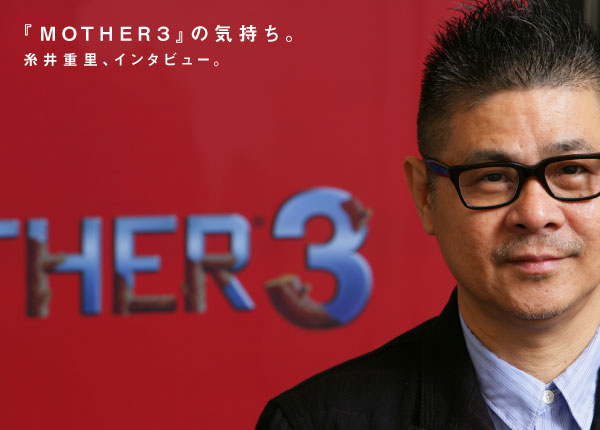
Miyamoto may have anticipated the future.
Itoi: At the very least I think he expected this trend to happen. And through our chat, he thought that I should follow through with it.
So in other words, while retaining your heart at the center of it all, all three of you decided to restart development with your own expectations in mind.
Itoi: We wouldn’t have been able to release it otherwise, would we?
That’s right.
Itoi: So, really at the end of the day, MOTHER 3 was born again after a combination of various things. The final results have yet to come in, but as of now, development is finished. So I feel as if I can say, “I’m glad I did it.”
Yes.
Itoi: But you know, even looking back…it’s such an interesting story.
Yes, it’s very interesting.
Itoi: So, to all the students reading this…I want you to remember one thing: “If you really want to achieve your goal, you need to plan four steps ahead instead of focusing on the destination.” That’s what I’d like to say, and I know it’s going to be scary. But, just trust me when I say you won’t be burning yourself out.
Yeah.
Itoi: Take it to heart when I say “making it happen” is a wonderful thing.
Anyway, MOTHER 3 will be released on April 20th. That’s finally going to happen.
Itoi: Yes, that’s right.
I heard that the idea for MOTHER 3 was born around the time development of MOTHER 2 finished.
Itoi: Right. It was actually when I was in the middle of making MOTHER 2 (laughs.)
What parts of the idea did you have in mind then?
Itoi: There’s parts of it still present in the current MOTHER 3, but some other parts are completely gone too. When I was making MOTHER 2, I became worried over the fact the game was becoming a lot like backgammon. After finishing one town, you move on to the next. And when you go back to the previous town, you find the NPCs there saying, “Thank you for the time we spent together.” I started to think that I didn’t need to follow this formula, so I thought, “Next time, let’s set the stage in a singular town.”
Ah, so that’s it.
Itoi: Rather than NPCs having their dialogue changed as the game progresses, time changes in the town itself. I wanted to create something where one town gradually changes over time. For example, if you scribble graffiti on a tree somewhere, it stays forever.
When I interviewed you ten years ago, you gave me a hint about MOTHER 3: “If you make a mess in your room before leaving for a school trip, it will still be there when you come back.” I recall you saying that.
Itoi: Yes, that’s right.
That’s because you were developing for the 64DD platform at the time, which had the selling factor of a large capacity storage medium. Did that affect your ideas?
Itoi: Yes. If we could’ve used it, instead of going to each town in order, you could go up the stairs and come back down to see that one town and it’s people growing in real time. I thought it would create a spiral of enjoyment, and that’s why I can give you a very simple example of this idea – it’s like “Animal Crossing.”
Ahhh. Come to think of it, I believe development of Animal Crossing also started out on the 64DD.
Itoi: Oh, I see. Basically, that’s the idea we had in mind.
I see.
Itoi: It’s not something I’d make anymore, but I can go on and on about all the details. I wanted to make the main character a lousy detective. So it’d take place in one town, with a detective who does all sorts of things, like investigating affairs, doing stakeouts, catching thieves and so on. This allowed the town and it’s people to become more three-dimensional, so at first that’s what I wanted to do.
It wasn’t so much “MOTHER 3”, as it was the next step after MOTHER 2.
Itoi: Yes, that’s right. I didn’t even name it “MOTHER 3”, just to be sure. However, the idea of small incidents being intertwined between stories from various people is a lot like the current MOTHER 3. The fact that the main character changes depending on the chapter was still a faint idea, even back in the beginning.
You said this phrase ten years ago to help explain the meaning behind switching protagonists, “The way I see you and how your mother sees you are completely different.”
Itoi: Oh, that’s right. That’s what I wanted to portray. And another thing is, I came up with this idea of a large structured story. I’m not going to go into detail, because it’s something still present in the current MOTHER 3. I think I wrote it while I was staying at some hotel. Immediately after I finished it, I showed it to the staff and they told me, “This is really interesting!” My heart was pounding in surprise at that, I remember the feeling very well.
So, at the time MOTHER 3 was a game with a huge plot behind it. We’ve already mentioned the three-dimensional structure. So, you were trying to express it all in a cinematic way using the latest technology at the time?
Itoi: Yes, that was the intent with the first MOTHER 3 on the N64. Considering it’s structure and the technology at the time, I thought, “anything is possible!” I was really overthinking it, and because of that I put whatever I wanted into the project. Originally, I was blowing smoke and mirrors as I’ve always felt that was my role in the MOTHER series. I know this might be strange to say, but during the production process, one of the young staff members who were making the game asked, “When do we give up?” I began to think, and more or less said to them we should give up only once someone said, “This is impossible!”
Ahhh.
Itoi: I’ll admit, I was a bit of a fool up until that point and had to lie. Truth is, I don’t know anything about technology. So while I was in this role I came up with all these ideas without worrying about the framework. However, all the young staff there went ahead and created it all anyway because they grew so attached to it. They really wanted to put everything in. That’s why it was so hard for them to say, “I can’t do this.” Of course, that’s not necessarily a bad thing, but in that situation it started taking a long time.
That’s one of the main reasons the first MOTHER 3 was never completed.
Itoi: That’s right. The first MOTHER 3 had a gradual start, and got cancelled just as it was about to get off the ground. Unfortunately, that’s how things turned out.
After the first MOTHER 3 was cancelled, development was restarted on the Game Boy Advance and took three years to complete.
Itoi: Yes, it’s been three years.
When development restarted, did you think it would take three years?
Itoi: Well, I had no idea really. So, I don’t think three years is all that long. I didn’t think it would be short, of course. Even if it had been completed immediately, I wouldn’t have thought it was short anyway.
Ahhh, I see.
Itoi: I’m a strict judge on whether the finished product is good or bad, but I’m not good at reading time. After all, it took me a long time to get back on track. And just like the previous MOTHER 3 that was cancelled, it still took a long time to get going (laughs.)
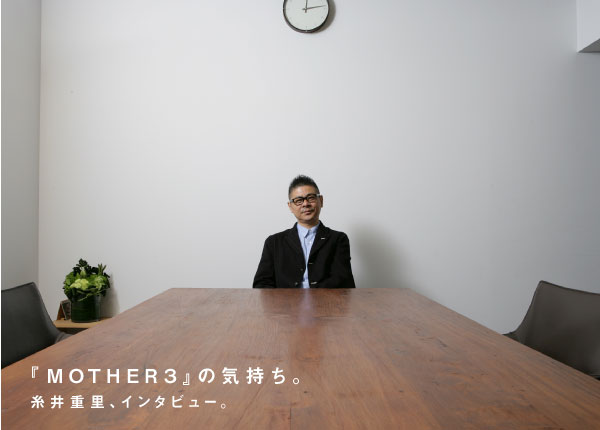
I agree. For the last three years, I was asked to attend the site. I found the first year in particular very concerning. While work was progressing fine, it just didn’t seem to be taking shape very well.
Itoi: Yeah.
Looking back, you seemed to eventually get it on track. When would you say the turning point of development was?
Itoi: In the early stages of development. Looking back on it now, I think it was a big decision when I decided that the visuals would be good “just looking like MOTHER.”
Oh, I see.
Itoi: I mean, when you create something new, naturally it’ll always be different. We tried, and tried, and no matter what it wasn’t coming out right. It was then I realized, “Let’s just follow the tone of the MOTHER series.” After I made it clear we were going to follow the tone of the previous games, it was only a matter of making adjustments to the art. In other words, it was
like we finally had a ruler for our drawings.
The first two years were very difficult, not only in terms of the art direction, but also with everything else. I think it was extremely difficult.
Itoi: At that point, the only point of reference we had was the cancelled N64 version of MOTHER 3. So, that made it a much more complicated matter.
It was during this complicated period of time you told me something that really made me think, “now I understand.” You said, “The MOTHER 3 we were working on at the time was fresh off the heels of MOTHER 2’s development. So, there were a lot of times where we thought, “Let’s surprise the MOTHER fans!” If the game had a smooth development and released as planned, I’m sure the fans would’ve been surprised like we wanted. But because it was cancelled and there was such a long gap, the feeling we wanted with “MOTHER” was lost.”
Itoi: Yes, that’s right. It was very difficult to adjust to that. So, for example, if a musician were to release a song identical to their last big hit, I’m sure there will be some people who say, “it was good this time too.” But, on the other hand some others might say, “Oh, not this again!” I’m the type of person who considers these opinions early on, so I tend to think people will be left unsurprised if I don’t make the effort to change. So, with that in mind, that’s why MOTHER 1 and 2 feel so different.
I agree.
Itoi: But the mood and worlds feel similar enough. So, when we decided to make MOTHER 3…this was twelve years ago now, so what I was thinking back then…my idea was to throw cold water on all the fans who loved MOTHER up until that point, and then make friends with them. I still had that lingering feeling even when development restarted, it was a problem to let go of it.
It seemed to me that this problem was one of the themes of development until the very end.
Itoi: Yes, it remained until the very end. But I kept on persisting, so I can say with confidence I was able to settle myself down. But, it was painful (laughs.) That was the most difficult part, but in the end it was still the most interesting aspect of the project. However, only by overcoming these struggles together with the staff were we able to create MOTHER 3 not “just for the fans”, but the “real” MOTHER 3.
Until development picked up steam, I had the impression communication between you and the development staff was difficult.
Itoi: That’s something inevitable, though. The development for the Game Boy Advance this time around…well, first off we learned our lesson from cancelling development prior. We wanted a team that could work quickly. I was introduced to a software studio called Brownie Brown by Nintendo. It’s kind of awkward to say, but it was kind of like a form of matchmaking. We started things off by exchanging business cards, so it took us a while to start communicating to each other just as friends.
It seems like both of you were a bit confused at first.
Itoi: I think initially I was a lot more confused than the people at Brownie Brown were. After all, “MOTHER” has a very special way of making things. I would tell them about the large structure, and then they would organize and give it shape until I gave them further orders. I often would say things like, “That’s completely different from what I had in mind!” But once they’d finished all the preparations, we could have a meeting and they’d say, “It might be different, but let’s fix it this way.” In that sense I have immense respect for the people at Brownie Brown. You could tell them, “It’s their job”, but if they say, “We can’t do this” then that’s the end of it.
I think it was about two years ago that development was slowly making headway?
Itoi: That’s when I started visiting Brownie Brown in Kichijoji, right? Until then, we kept in close contact with one another, and then Brownie Brown said alongside the others, “Well, we can’t do this kind of thing ourselves.” I think that’s when things started moving forward. I don’t know if we were feeling courageous, or if things were getting more fun, but it was around then the atmosphere started to feel really welcoming. I remember eventually being presented an image of a strange creature in a castle full of ghosts, and I said, “Yes! This background is fantastic!” Originally, I wasn’t interested in pixel art or 2D animation. But, they’re excellent at giving it such a sense of detail.
Indeed. That’s what I find so special about “MOTHER”. It allows staff to create art according to the scenario, before piecing the game itself later on. Oftentimes, that isn’t the case for other games.
Itoi: That seems about right (laughs.)
I recall something you said earlier, “If I just take a month or so to myself, and concentrate on writing interesting dialogue and scenarios, I’m sure I can do it!” To put it bluntly, your job for the first two years was spent refining all the words in the script.
Itoi: That’s right. I’ve often heard people say “Words are the essence of MOTHER.” Although it may seem easy, you can’t just slap sushi ingredients into a sandwich and call it a day. In saying that, the development staff was stumped when it came to the writing portion of the game. It took about two years before I could tell them, “That’s a wrap. I’ll take care of the rest of the writing myself.”
Yeah.
Itoi: But, I really don’t know if I have the power to accomplish things with words alone. I’m not sure anyone knows they can do that for certain. So, that’s why Iwata-san ended up saying to me, “If you write the words yourself at the end, the game will come together from there. I don’t care if you say otherwise.” There’s also a part of me that felt the same way.
Oh, is that so?
Itoi: Yeah, that’s right.
So do you truly feel that way, then?
Itoi: Yeah, I do. I have a lot of experience, although I know whatever I may think is good doesn’t account for everything.
I guess you couldn’t compare it to lacking confidence then, or something like that?
Itoi: I’m confident enough to say, “It’ll be fine as long as I write all the words later.” Even though I know that’s confident of me to say, that type of confidence and conviction doesn’t come from one person alone. I’m not sure how to put it into words, but…you can’t have a midpoint without two axes. You’d have to use a compass twice in that case.
Ah, I see. So that’s it.
Itoi: No matter what it is, you have to search for the point with two things. At the time, I felt like a person searching for that point by himself, muttering under his breath, “This was a mistake.”
That’s a very important point, isn’t it?
ItoI: It’s an extremely important point. Having your own giant compass isn’t enough.
So before finishing all the game’s text…it was like in some sense you had entered a “training camp” with only one compass, just for yourself.
Itoi: Yeah. That’s what it was like for two years.
So, at the end of the day as you kept adding words to the story while at “camp”, the game became more and more like “MOTHER.”
Itoi: It did become more and more like “MOTHER” (laughs.) But that’s because we had a second compass, or maybe even four. I’m not sure of the exact number, but there were many.
It was around last summer when we heard the game was 70 to 80% complete. It was around then you started “training camp” to add words into MOTHER 3.
Itoi: That took a long time. I did it while in Kichijoji, Shibuya, and the Hobonichi office.
Yeah. First of all, the game contains your initial scenario and all the text you wrote over the last two years while at meetings. I have a huge file of them all pasted into an Excel table. You rewrote every single word in the file, including everything you had written in the past. It was a tremendous task.
Itoi: That’s correct. There were some that I thought, “It’s fine to leave this as is.” But, about 90% of them are mine…or maybe all of them?
The majority of them are yours. I’d say there’s maybe about 10% that weren’t rewritten.
Itoi: I guess I wasn’t able to finish it all in one month (laughs.)
According to our attendance reports, we’d gather at the hotel room around 10 in the morning, have a break to get some food and then stay until 2 AM. This would be over the course of three days and two nights of work.
Itoi: It felt impossible, didn’t it? I’m glad that’s over with. I wouldn’t be able to handle anymore, because including all the time wasted slacking off, I was in the same place for 15 hours straight. With the same people the entire time, too.
Well then, as for all the members, first we had Kazuyuki Gofuku, a progress supervisor from Nintendo. He would call up all the necessary files and say, “Today, we’re going to start and end here.” And then Itoi-san would create each line verbally speaking character by character. Akihito Toda (who was an assistant scenario writer for MOTHER 2) would write the lines down and then review them. We all laughed and nodded while listening, then made sure we agreed it was all “okay.” Gofuku-san would then write and compile everything into a new Excel file.
Itoi: There’s no way we made it that way (laughs.)
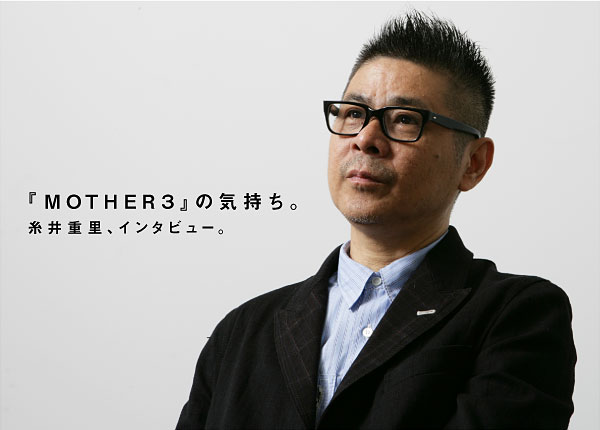
I heard back when you were making MOTHER 2, you’d recite each line and the staff would write them down. Was the process any different from the way you wrote MOTHER 3?
Itoi: It was different. For MOTHER 2, it was only two of us. Me, and the girl who would write down my lines. It was as if this girl felt she was in a weaker position, or believed her role was to say, “wow.” It still felt good for me to say it all, but when I got out of control, she couldn’t stop me. If I do that, it all begins to fall apart and I can’t make clear decisions. So, I needed a small gallery this time around as if it was my first group of customers. It really feels like playing in front of a small audience.
Oh, I see.
Itoi: A good example would be “Samna no Manma.” There are around 26 people in the studio while he’s recording including the crew and spectators, but it’s not like any of them are invited guests. Sometimes Samna-san will tease the spectators and ask, “Do you like this or not?” I think things would turn out differently if not for that.
It’s a bit like having a third eye, isn’t it?
Itoi: You see, that “little acknowledgment” is what gets me by. It might be a little rude to say, but sometimes I feel like, “Just respond! I don’t care how you react!” So those customers really are essential.
Yeah (laughs.)
Itoi: I’m not sure if you’d call it an advisor, observer, or an onlooker, but it seems there aren’t many people in Japan who can do that. The minimum you can trust in a customer is to smile while you concentrate on saying your next line. If I can feel the people next to me laughing as their hearts beat faster, I start to think, “Oh my god! It’s working!” When you have such an environment, you can strongly bounce off each other in a short amount of time. I would say a line, see the reaction, and then change it or move on. Because I can do that back and forth on the spot, I have more of an opportunity to change and fix things.
Yeah.
Itoi: And the important part depends on where the rails are going to switch. For example, I’d say, “Oh, wait, I’ll fix that again.” Gofuku-san would then write it down and I’d ask, “So, how about it? What do you think?” From there, he’d refer to specific details most would find incidental.
So it really was like a training camp.
Itoi: There were times where I would run and suddenly be stopped. On the contrary, sometimes I’d also play the role of stopping them.
One line of dialogue can solve about three problems at once. You can retroactively fix things with one action, as if you’re going back in time.
Itoi: You know, it was all about balancing the density of work. It was pretty dense, wasn’t it? It was more than just work, really. I’m a little sad it’s over now.
Yeah, it is a little sad.
Itoi: I’ll never have an opportunity or job like that again.
I wonder what else you’d be doing, if we weren’t standing around there.
Itoi: No, no, I mean I do have other jobs. I’d just like to do something else that dense again.
Anyway, that’s how it all went. The more that camp went on, the more lines we ended up coming up with. But the interesting part is…as I was somebody who witnessed it all coming together – when Itoi-san’s lines came in one after another, the game stunningly became a lot like “MOTHER.”
Itoi: Just like Iwata-san said (laughs.)
Yes, just like he said it would. You had a very rough time during the “training camp.” Even if it was a line I had seen many times, in most cases you’d end up either cutting it out or completely rewriting it.
Itoi: “Oh, I just looked over all this, and it’s infuriating.” So on, and so on.
(Laughs.)
Itoi: One thing I noticed is the people who did all the prep work at Brownie Brown are pretty young in age. It’s been about four or so generations since the game creators of my time. So, it’s only natural that things feel differently now. I was worried my sense of humor wouldn’t sit well with the younger generation, but I think it turned out fine when I finished it.
I see.
Itoi: Strictly speaking, it’s not something I can judge. However, if we’re going to make “MOTHER”, it has to be done this way.
I was not only impressed by your ability to fix things that were wrong, but also the ability to fix things that seemed correct. Stuff like changing “Hello” to “Oh, hello there.”
Itoi: That’s an aspect of physiology applied to written form. It’s something I can’t help. If you ask me why a simple “hello” won’t suffice, I can’t really give you a reason why.
So that’s it. And while you were making some lines detailed and longer, you were also revising others to make them extremely simple.
Itoi: There were many things I intentionally omitted. I deliberately returned to any lines I found cliché. I don’t know how to explain this, but if you speak humorously all the time eventually it gets sloppy. The frogs were symbolic of this, weren’t they?
At the beginning of the training camp, it was decided every Save Frog would have a unique line of dialogue.
Itoi: Ah, yes…that’s how it turned out. “All the frogs say something different” as we intended.
Yeah. Even when I played the actual game I felt obligated to talk to every one of them.
Itoi: So the first thing I did was figure out all the common lines they would share, right? And then I would say, “Let’s change the frog here.” So in the end, it was double the amount of work. I’d come up with stuff like, “Let’s boil this frog in water!” I made these kinds of big decisions many times during camp.
The whole room tingles in excitement when those decisions are made.
Itoi: I don’t know what to call it, but there’s a moment where I get really serious and clench my teeth. I get in this mood, where I don’t care even if I get hit a few times. Even when the other staff members around me would say, “Huh?!” There were moments when I retaliated and declared, “No, I’m going to do this! I’m going to do this!” When that happened, I felt like Asashoryu (laughs.)
(Laughs.)
Itoi: It was a raw, animalistic feeling like, “I’m the one on top of this moment!” Otherwise, it would all be boring and halfhearted. Anywho, it’s something I can only do because I’m dealing with people who understand each other. I wonder how to put it…but it’s like the feeling of clenching your ass cheeks together and saying, “Good!” in a sigh of relief. It’s the same feeling you might’ve had as a child.
Yeah (laughs.)
Itoi: It’s something I feel is absolutely necessary. I don’t know for sure, but maybe it’s something akin to the beastliness of an athlete. I think it’s something also present in the creative process, like when you yell, “Shut up!” (laughs.)
The staff members around me would say, “If Itoi-san goes through with this, it’s really going to affect him!” But before I could finish saying anything to you, you’d say, “Oh, well, that’s okay!” (laughs.)
Itoi: Hahahahaha. The animal in me was already free, wasn’t it? But then afterwards they’d say, “See, your previous problem will be solved if you just do this, okay?” You know, it’s a little embarrassing for a human being to act like an animal. So, you can’t act like an animal in a place with no field. Thankfully, the training camp was the perfect field to unleash the beast in me, since others around me knew the steps we were taking. It’s good to know the time and place to be an animal, since it’s unhealthy to make a habit of it.
In any other case, it’d come across as a violent or “pushy” person.
Itoi: In that sense, It’s amazing I’ve met people who understand me. It’s a really great thing to have good friends like that. If you have the desire to make something of yourself, to ask others questions, and to make the most of your life, don’t sit around halfheartedly smiling; at least try to win the village sumo tournament by clenching your ass cheeks. It’s something I encourage others to try.
One of the major themes of MOTHER 3 is “family.” Was this originally part of the plot you came up with at the end of development for MOTHER 2?
Itoi: No, that was unintentional.
Oh, I see.
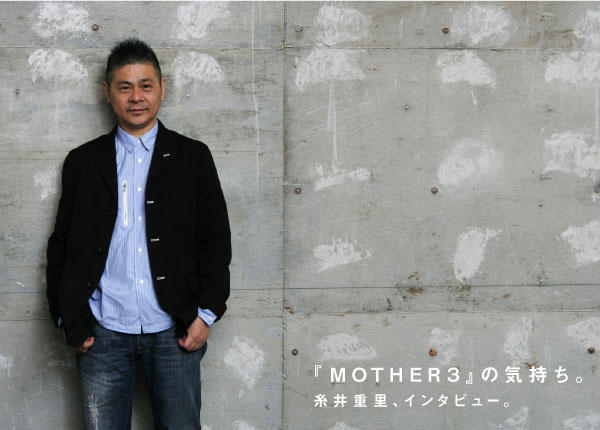
Itoi: Yeah, it happened unintentionally. I could explain the reasoning behind most of my decisions, but I didn’t necessarily choose to include that one.
I guess what you’re saying is it incidentally came into being.
Itoi: That’s what I’m saying. Hmmm…so creativity is something I’ve been thinking a lot about lately. I’ll often notice things I don’t even remember making. I think that’s the source behind creativity. In that sense, there are many things I don’t remember intentionally including in MOTHER 3, such as stories about family, parents, children and siblings.
But the end result is very colourful, isn’t it?
Itoi: I think so. It’s just…I don’t know if it’s really a story about family. Maybe it’s a so-called “Blood Story”, since the story follows a family related by blood. But even then, it’s not really all about that, is it?
Yeah.
Itoi: So many people have written stories about blood relations. While MOTHER 3 is also a story about family, it’s not really concerned with that connection in particular. I feel it’s touching upon something beyond that.
It’s not a traditional happy family, just like MOTHER 1 and 2 before it. Nonetheless, those family ties are still present. Was that an unintentional decision as well?
Itoi: It was all unintentional. To be honest, it’s like we’ve been misled to believe the system we call “family” has existed since time began. I think stories of blood relations are attributed to that ideology. It’s something people have immersed themselves in, haven’t they? But what if it’s possible that wasn’t the case a long time ago? As much as people hate the idea, it’s not impossible that there may come a time when we all raise our children together. In fact, it already feels like the family system is on the verge of collapsing. However, I don’t want to say whether that’s a good or bad thing.
I understand.
Itoi: In lighter terms, what’s the difference between marriage and cohabitation? It’s something that’s starting to become more ambiguous. Often I find in situations where both the mother and father work, they don’t eat dinner together at the dining table anymore. If that system were to disappear, I’d be concerned what I’m presenting wouldn’t align with how everyone views “family.” It’s something you’d either be blamed by others or yourself for. Although in that case, I don’t think you should blame yourself for failing to stick the landing. People will either stay addicted to their beliefs, or let go of them. Isn’t that part of the search for happiness after all? Regardless, there’s still many things along those lines in MOTHER 1 and 2.
I agree.
Itoi: However, the hidden flavours in MOTHER 3 are particularly strong.
They’re very strong, aren’t they?
Itoi: Yeah. Although I won’t spoil much of the story details, the Magyspy characters in MOTHER 3 are a symbol of family unrelated by blood.
Ah, I see.
Itoi: Oh, and one more thing about MOTHER 3. Although I don’t recall it being my intention to include family as a major theme, there is a reason it became so prominent. Back when we first created the scenario with our team, one of the staff members just had a baby.
Ohhh.
Itoi: That left quite an impression on me. Although I have children of my own, they’re all grown up now so we’re quite distant these days. If I had given birth to a child, I’d have been unable to commit the time to write the game’s script. But, this other staff member had a little child who could barely walk, who they protected like one of their own internal organs. That feeling really affected me. Sometimes I’d casually read out a line I’d just written and he’d painfully react, “Oh my God!” After hearing that, I’d reconsider what I’d written. It’s not my goal to inflict such a painful feeling.
I see what you mean.
Itoi: Really, my aim is always for people to scratch their heads over my jokes and tell them, “Don’t be ashamed! It’s fine, it’s fine!” That’s something I don’t hesitate to do (laughs.)
(Laughs.)
Itoi: So that’s why it really affected me. I remember the trigger to his reaction very well, as it was a short line from the grave keeper describing Flint’s role in the story. I wrote it casually without a second thought, but if I were that father, I probably wouldn’t have made it. It really resonated with him since he had a child. He said to me, “I understand why a father would do something like that, I’m sure I would’ve done the same too.” I was a little surprised and stricken back at first, but as I kept on thinking I decided, “This feels so much better.” In fact, the second half of the story changed based on that feeling alone. If I were to write every character as if it were me, I wouldn’t help but feel “Man, I hate this guy!” I wanted to make the characters reflect all of us. That’s what made creating the script so fun and interesting. I don’t think you’d be able to do something like that when making a novel by yourself.
Now that I think about it, I don’t think you have many pure “Shigesato Itoi” works.
Itoi: No, I don’t.
At least I know I’ve been involved in many things, but there isn’t a lot of stuff you’ve created personally.
Itoi: Wellllllll, it’s hard to make things.
(Laughs.)
Itoi: I can’t make a lot of stuff since I have problems struggling with time. There is a big difference between eating sushi somewhere as an author instead of eating there as somebody else. In the long run, I no longer work as an author so I can have more time in exchange.
This time around, you were the author for MOTHER 3 though.
Itoi: I guess so. Isn’t that unusual? I suppose I’m both the author and the creator.
(Laughs.)
Itoi: Surprisingly I lack the desire to be. (laughs.)
I lack desire too. Even though my typical line of work is very different from yours, I always say, “I don’t know” when asked about promotions.
Itoi: I don’t know then, I don’t know anymore.
(Laughs.)
Itoi: You know, recently I’ve been reading Amazon reviews.
Ahahahahaha.
Itoi: I was thinking to myself, “Welllllll, is this any good?” but then I thought, “the only reviews I can find are on Amazon.”
So then, if I told you “I want you to sell this game I have called MOTHER 3” and you had nothing to do with its creation, would you find it an easy sell?
Itoi: Let’s see…I don’t know. It’s hard to do it yourself.
That reminds me, I found it surprising when I joined the Hobonichi offices and found you weren’t creating the MOTHER commercials on your own.
Itoi: Oh, that’s a terrible misunderstanding.
Basically, your role is to judge what the agency creates.
Itoi: Yeah, that’s right. I still write my own version though. Also, I was the one who requested Takuya Kimura for MOTHER 2.
But the production side of things such as the storyboards are done by the agency. That’s how the commercials for MOTHER 3 were made, you weren’t involved with the planning.
Itoi: That’s right.
Isn’t that really surprising?
Itoi: Is it?
Why didn’t you do it yourself?
Itoi: It’s hard to do.
How hard can it be?
Itoi: It’s really hard to do.
So it’s really that difficult?
Itoi: Because if I were to do it all myself, they’d ask “What’s so great about you?”
Yeah, maybe, I guess.
Itoi: That’s why it’s hard to do.
But I’m sure many others do it.
Itoi: I don’t know who (laughs.)
Well, back to our main topic, The slogan for MOTHER 3 is, “Strange, Funny, and Heartrending.”
Itoi: Yeah.
That’s pretty straightforward.
Itoi: Oh, really?

Because the slogan for MOTHER 2, “Grownups, kids, and even young women” comments more on the current game industry rather than the game itself.
Itoi: Yeah. If you think about it, that’s a good tagline for the Nintendo DS (laughs.)
Yeah, yeah it is (laughs.) In that sense, it was a slogan for gaming as a whole, rather than simply MOTHER 2.
Itoi: Yes, it was.
MOTHER 3’s slogan seems straightforward for what the game is.
Itoi: I know. That’s because I had to re-introduce myself.
Ahhhhh.
Itoi: After all, I couldn’t just run into the room and scream, “We’re back, everyone!” like it’s all come full circle. I felt it necessary to refrain myself and be polite.
I see.
Itoi: For example, even if I entered a place where everyone knew “this person is Shigesato Itoi”, I’d still introduce myself and say, “Hello, I’m Shigesato Itoi.” This time around I approached things feeling as if I was straightening my collar.
And yet, after all this time…I still feel you’re a little reserved. (laughs.)
Itoi: I’m still a little hesitant, aren’t I (laughs)? Because I already had to cancel the project once before, I made a habit of staying quiet until it came out (laughs.)
Please stay strong!
Itoi: No, I’m confident. I really am. I’ll even write, “I’m super confident!” down in big letters to prove it to you.
But I’m not sure if you can say, “I’m wonderful!” out loud.
Itoi: I’d rather not…
(Laughs.)
Itoi: So now we have no choice but to trust each other, don’t we? I trust in all the people who already played the game and said it was good. If those people who played the game tell us what they liked first and then whatever they didn’t like, we can find the right balance in their honesty. I put all my trust in them.
Source to original interview (1/10)
Source to original interview (2/10)
Source to original interview (3/10)
Source to original interview (4/10)
Source to original interview (5/10)
Source to original interview (6/10)
Source to original interview (7/10)
Source to original interview (8/10)
Source to original interview (9/10)
Source to original interview (10/10)








